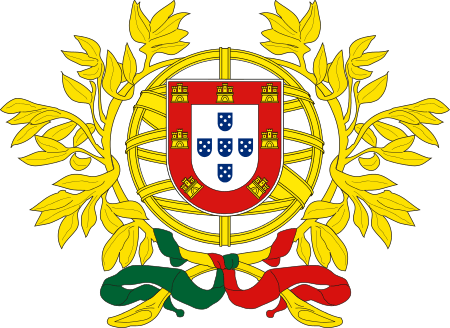António Guterres
António Manuel de Oliveira Guterres GCC GCL (/ɡʊˈtɛrəs/; European Portuguese: [ɐ̃ˈtɔnju ɡuˈtɛʁɨʃ]; born 30 April 1949) is a Portuguese politician and diplomat serving as the ninth Secretary-General of the United Nations. A member of the Portuguese Socialist Party, he served as Prime Minister of Portugal from 1995 to 2002.
António Guterres | |
|---|---|
_(cropped).jpg) Guterres in 2019 | |
| 9th Secretary-General of the United Nations | |
| Assumed office 1 January 2017 | |
| Deputy | Amina Mohammed |
| Preceded by | Ban Ki-moon |
| United Nations High Commissioner for Refugees | |
| In office 15 June 2005 – 31 December 2015 | |
| Secretary-General | Kofi Annan Ban Ki-moon |
| Preceded by | Ruud Lubbers |
| Succeeded by | Filippo Grandi |
| Prime Minister of Portugal | |
| In office 28 October 1995 – 6 April 2002 | |
| President | Mário Soares Jorge Sampaio |
| Preceded by | Aníbal Cavaco Silva |
| Succeeded by | José Manuel Barroso |
| President of the Socialist International | |
| In office 10 November 1999 – 15 June 2005 | |
| Preceded by | Pierre Mauroy |
| Succeeded by | George Papandreou |
| Secretary-General of the Socialist Party | |
| In office 23 February 1992 – 21 January 2002 | |
| President | António de Almeida Santos |
| Preceded by | Jorge Sampaio |
| Succeeded by | Eduardo Ferro Rodrigues |
| Leader of the Opposition | |
| In office 23 February 1992 – 28 October 1995 | |
| Prime Minister | Aníbal Cavaco Silva |
| Preceded by | Jorge Sampaio |
| Succeeded by | Fernando Nogueira |
| Member of the Assembly of the Republic | |
| In office 3 June 1976 – 4 April 2002 | |
| Constituency | Castelo Branco |
| Personal details | |
| Born | António Manuel de Oliveira Guterres 30 April 1949 Lisbon, Portugal |
| Nationality | Portuguese |
| Political party | Socialist |
| Spouse(s) | Luísa Guimarães e Melo
( m. 1972; died 1998) |
| Children | 2 |
| Alma mater | Instituto Superior Técnico - University of Lisbon |
| Signature | |
| Website | António Guterres |
Guterres served as secretary-general of the Socialist Party from 1992 to 2002. He was elected prime minister of Portugal in 1995 and resigned in 2002 after the Socialist Party was defeated in the 2001 Portuguese local elections. After six years governing without an absolute majority and with a bad economy, the Socialist Party did worse than expected because of losses in Lisbon and Porto, where polls showed it with a solid lead. Eduardo Ferro Rodrigues assumed the Socialist Party leadership, but the general election was lost to the Social Democratic Party, led by José Manuel Barroso.
Guterres served as president of the Socialist International from 1999 to 2005. He was the United Nations High Commissioner for Refugees from 2005 to 2015.[1] In both a 2012 and 2014 poll, the Portuguese public ranked him the best prime minister of the previous 30 years.[2][3]
Early life
Guterres was born and raised in Lisbon, Portugal, the son of Virgílio Dias Guterres (1913–2009) and Ilda Cândida de Oliveira (born 1923).
He attended the Camões Lyceum (now Camões Secondary School), where he graduated in 1965, winning the National Lyceums Award (Prémio Nacional dos Liceus) as the best student in the country. He studied physics and electrical engineering at Instituto Superior Técnico – University of Lisbon in Lisbon. He graduated in 1971 and started an academic career as an assistant professor teaching systems theory and telecommunications signals, before leaving academic life to start a political career.[4]
Political career
Guterres's political career began in 1974, when he became a member of the Socialist Party. Shortly thereafter, he quit academic life and became a full-time politician. In the period following the Carnation Revolution of 25 April 1974 that put an end to Caetano's dictatorship, Guterres became involved in Socialist Party leadership and held the following offices:
- Head of Office of the Secretary of State of Industry (1974 and 1975)[5]
- Deputy for Castelo Branco in the Portuguese National Parliament (1976–1995)[6]
- Leader of the parliamentary bench of the Socialist Party, succeeding Jorge Sampaio (1988)
Guterres was a member of the team that negotiated the terms of Portugal's entry into the European Union in the late 1970s.[7] He was a founding member of the Portuguese Refugee Council in 1991.[8]
In 1992, after the Socialists' third consecutive defeat in Parliamentary elections,[9] Guterres became secretary-general of the Socialist Party and leader of the opposition during Aníbal Cavaco Silva's government.[10] At the time, he was the party's third leader in six years.[11] He was also selected as one of the 25 vice presidents of the Socialist International in September 1992.[12]
His election represented a break with tradition for the Socialists: not only was Guterres not associated with either the faction around then-president and former prime minister Mário Soares or the party's left wing led by Guterres's predecessor Sampaio, but he was also a devout Catholic, running counter to the party's historical secularism. He consulted with Portugal's civil society in formulating policy, meeting a range of intellectuals, scientists and entrepreneurs from across the country and the political spectrum in the run-up to the next general election.[9]
Prime Minister of Portugal
Aníbal Cavaco Silva did not seek a fourth term as prime minister of Portugal (in order to run for the 1996 Presidential election) and the Socialist Party won the 1995 parliamentary election. President Soares appointed Guterres as prime minister[13] and his Cabinet took the oath of office on 28 October that year.
Guterres ran on a platform of keeping a tight hold on budget spending and inflation in a bid to ensure that Portugal met the Euro convergence criteria by the end of the decade, as well as increasing rates of participation in the labor market, especially among women, improving tax collection and cracking down on tax evasion, increased involvement of the mutual and nonprofit sectors in providing welfare services, a means-tested guaranteed minimum income (known as the Rendimento Minimo Garantido), and increased investment in education.[9] He was then one of seven Social Democratic prime ministers in the European Union, joining political allies in Spain, Denmark, Finland, Sweden, Greece and the Netherlands.[14]
First term (1995–1999)
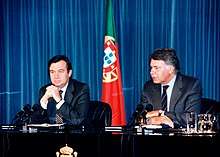
With a style markedly different from that of his predecessor, and based on dialogue and discussion with all sections of society, Guterres was a popular prime minister in his first years in office. Portugal was enjoying an economic expansion that allowed the Socialists to reduce budget deficits while increasing welfare spending and creating new conditional cash transfer programs.[15] His government also accelerated the program of privatizations that Cavaco Silva's government had begun: 29 companies were privatized between 1996 and 1999, with proceeds from privatizations in 1996–97 greater than those of the previous six years, and the public sector's share of GDP halved from 11% in 1994 to 5.5% five years later. Share ownership was also widened, with 800,000 people investing in Portugal Telecom upon its privatization in 1996 and 750,000 applying for shares in Electricidade de Portugal.[9]
In 1998, Guterres presided over Expo 98 in Lisbon, commemorating the 500th anniversary of the voyage of Vasco da Gama.[16] Also in 1998, two nationwide referenda were held. The first one was held in June and asked voters whether abortion rules should be liberalized. The Socialist Party split over the issue of liberalization, and Guterres led the pro-life side, which eventually won the referendum.[15] A second referendum was held in November, this time over the regionalization of the mainland. Both Guterres and his party supported such an administrative reform, but the voters rejected it.
Contrary to his party stance and following the removal of homosexuality from the list of mental illnesses by the World Health Organization in 1990, Guterres said, in 1995, that "he did not like homosexuality" and that it was "something that bothered him".[17]
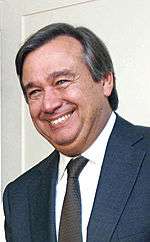
On foreign policy, Guterres campaigned for United Nations intervention in East Timor in 1999, after it was virtually destroyed by Indonesian-backed militias when it voted for independence.[8] He also finalized the 12-year negotiations on the transfer of sovereignty over Macau, which had been a Portuguese colony, to Chinese control in 1999.[18]
Second term (1999–2002)
In the 1999 parliamentary election the Socialist Party and the opposition won exactly the same number of MPs (115). Guterres was reappointed to office and from January to July 2000 occupied the six-month rotating presidency of the European Council. His second term in government was not as successful, however. Internal party conflicts, an economic slowdown, and the Hintze Ribeiro Bridge disaster damaged his authority and popularity. Nevertheless, some long-lasting measures were taken during his second term: in October 2000, the Parliament approved the decriminalization of drug use (effective 1 July 2001)[19] and in March 2001, same-sex civil unions were legalized.[18][20]
In December 2001, following a disastrous defeat for the Socialist Party in local elections, Guterres resigned[13] to "prevent the country from falling into a political swamp".[21] President Jorge Sampaio dissolved Parliament and called for elections. Eduardo Ferro Rodrigues, until then Minister for Social Security, assumed the Socialist Party leadership, but the general election was lost to the Social Democratic Party of José Manuel Durão Barroso, who later became President of the European Commission.
President of Socialist International
Guterres was elected president of Socialist International in November 1999,[22] overlapping with his second term as prime minister of Portugal until his resignation from the latter post in December 2001. He remained president of the Socialist International until June 2005.[22]
Diplomatic career
In 2005, following Guterres's proposal, George Papandreou was elected vice president of the Socialist International; in 2006, Papandreou succeeded him as president of the Socialist International.
In May 2005, Guterres was elected High Commissioner for Refugees for a five-year term by the UN General Assembly, replacing Ruud Lubbers.[23][22]
High Commissioner for Refugees
As High Commissioner, Guterres headed one of the world's largest humanitarian organizations, which at the end of his term had more than 10,000 staff working in 126 countries providing protection and assistance to over 60 million refugees, returnees, internally displaced people and stateless persons. His time in office was marked by a fundamental organizational reform, cutting staff and administrative costs in the UNHCR's Geneva head office and expanding UNHCR's emergency response capacity during the worst displacement crisis since the Second World War.[24][25]
On 19–23 March 2006, Guterres visited Beijing, China, and expressed his objection to repatriation of North Korean refugees by the Chinese government.[26][27]
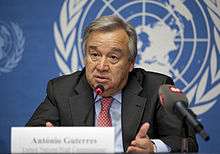
In a February 2007 NPR interview devoted mainly to the plight of Iraqi refugees, Guterres said that this was one of the greatest refugee crises in the Middle East since 1948. Among poorly publicized refugee crises, he cited those in the Central African Republic and the Democratic Republic of the Congo.[28] During his final years as High Commissioner, he worked chiefly to secure international aid for the refugees of the Syrian civil war, calling the refugee crisis an "existential" one for host countries (such as Lebanon and Jordan), and calling additional aid a "matter of survival" for the refugees.[29] He was an outspoken advocate for a more coordinated and humane approach by European countries to the Mediterranean refugee crisis.[30] In June 2013, he launched a US$5 billion aid effort, its biggest ever, to help up to 10.25 million Syrians that year.[31]
In what was widely considered a very effective PR move, Guterres appointed American actress Angelina Jolie as his special envoy to represent UNHCR and himself at the diplomatic level in 2012.[32] Together they visited the Kilis Oncupinar Accommodation Facility in Turkey (2012);[33] the Zaatari refugee camp in Jordan (2013);[34] and the Maritime Squadron of the Armed Forces of Malta (2015). They also appeared jointly before the United Nations Security Council (2015).[35]
In early 2015, the General Assembly voted to extend Guterres's mandate by 61⁄2 months to 31 December, on recommendation of United Nations Secretary-General Ban Ki-moon. In light of the European migrant crisis, the UNHCR's 98-member executive committee (EXCOM) later requested that Ban recommend extending Guterres's term by another year, but Ban disregarded the request.[36] Guterres left office on 31 December 2015, having served the second-longest term as High Commissioner in the organization's history, after Prince Sadruddin Aga Khan.[37]
In 2015, President Marcelo Rebelo de Sousa appointed Guterres to serve as a Member of the Council of State of Portugal; he resigned after being appointed as the UN's 9th Secretary-General.[38][39]
United Nations Secretary-General
Candidacy
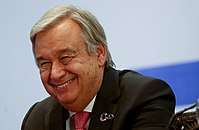
Guterres became United Nations Secretary-General on 1 January 2017, following his formal election by the UN General Assembly on 13 October 2016.[40]
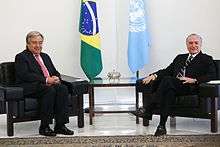
On 29 February 2016, Guterres submitted his nomination as Portugal's candidate for the 2016 UN Secretary-General selection.[41] This was the first time candidates for secretary-general had to present their platform in public hearings in the UN General Assembly, a process during which Guterres emerged as a much stronger candidate than had been initially expected, given that he fit the bill on neither the gender nor the geographic scores.[42]
On 5 October, the 15-member United Nations Security Council announced that it had agreed to nominate Guterres, after an informal secret ballot in which he gained 13 "encourage" votes and two "no opinion" votes.[43][44] The Security Council officially nominated Guterres in a formal resolution on 6 October. A week later, he was formally elected by the United Nations General Assembly in its 71st session. Guterres took office on 1 January 2017.[45]
.jpg)
The UN's role in the Haiti cholera outbreak was widely discussed and criticized[46] after the Ban Ki-moon administration denied the issue for several months. According to the Boston-based Institute for Justice & Democracy in Haiti as well as numerous conclusive scientific studies, the UN is the proximate cause for bringing cholera to Haiti. Peacekeepers sent to Haiti from Nepal in 2010 were carrying asymptomatic cholera and failed to treat their waste properly before dumping it into one of Haiti's main water streams.[47] During his UNSG informal dialogue, Jamaica, on behalf of the Caribbean Community, asked if the UN should assume liability for any deaths within local populations that result from the introduction of infectious disease by its peacekeepers. Jamaica also asked if Guterres believed compensation should be provided.[48] Guterres responded by calling the situation a "particularly complex question", saying it was difficult to preserve diplomatic immunity while also ensuring there is no impunity, but that he would "pay a lot of attention in trying to find the right equilibrium between these two aspects that are absolutely crucial".[48] In a UN General Assembly meeting in late October 2016, the representative from Haiti called the UN's current and future response to the cholera epidemic "a litmus test of the system's commitment to the promotion of human rights".[49] Though many had hoped Guterres's term would mark a break with the inaction that characterized Ban's response to the epidemic, Guterres has done little to signal a commitment to Haitian cholera victims. As of April 2017, five months into his term as secretary-general, only $10 million had been contributed to the $400 million fund to fight cholera and provide material assistance to victims the UN announced in 2016.[50]
_04.jpg)
In 2016, Anders Kompass exposed the sexual assault of children by peacekeepers in the Central African Republic and, as a consequence, was dismissed by Ban's administration before being rehabilitated in court.[51] During the United Nations Secretary-General Candidate informal dialogues, Guterres indicated it was completely unacceptable that there be UN forces committing human rights violations such as rape and sexual violence. "All of us together—states and UN—must do our utmost to ensure that any kind of action of this type is severely punished," he said.[48] The United States raised the question of international tribunals to try peacekeepers for their crimes. Guterres responded by saying an independent jurisdiction would be excellent but that "the only way to get there is through a new compact with all key parties—true contributors, financial contributors—and to make sure that there is an adjustment in the relation between countries, the UN, and the support those that are contributing with troops receive, in order to be able to do it much better."[48] He also indicated that there is a gap between theoretical zero tolerance and the ineffective zero tolerance that actually exists on the ground and needs to be overcome.
Tenure
.jpg)
On 1 January 2017, on his first day at the helm of the United Nations as secretary-general, Guterres pledged to make 2017 a year for peace. "Let us resolve to put peace first," he said.[52]
On 12 April 2017, Guterres appointed an 8-member Independent Panel[53] to assess and enhance the effectiveness of UN-Habitat after Adoption of the New Urban Agenda. The panel's recommendation to establish an independent coordinating mechanism, ‘UN-Urban’[54] met with criticism from urban experts and the African Urban Institute.[55]
On 20 June 2017, "Secretary-General António Guterres warned the Trump administration ... that if the United States disengages from many issues confronting the international community it will be replaced".[56]

In response to the death of Chinese Nobel Peace Prize laureate Liu Xiaobo, who died of organ failure while in government custody, Guterres said he was deeply saddened.[57]
After the violence during the 2017 Catalan independence referendum, Guterres trusted Spanish institutions to find a solution.[58] He gave the same message when Catalonia declared independence on 27 October 2017 but said the solution should be made under the constitutional framework.[59]
Guterres criticized the Saudi Arabian-led intervention in Yemen and the naval, land and air blockade of Yemen. The blockade has further aggravated Yemen's severe humanitarian crisis.[60] Guterres said that the intervention in Yemen "is a stupid war. I think this war is against the interests of Saudi Arabia and the Emirates... [and] of the people of Yemen."[61]
Guterres opposed President Trump's decision to recognize Jerusalem as Israel's capital.[62]
In March 2018, Guterres said the population of Syria's Eastern Ghouta was living in "hell on earth". In one district, 93% of buildings had been damaged or destroyed by December, according to UN satellite imagery analysis. A recent wave of bombings has caused further destruction.[63]
Guterres called the 2018 North Korea–United States summit a "crucial milestone" for nuclear disarmament. He urged both sides to "seize this momentous opportunity" and offered UN assistance to achieve the goal of dismantling North Korea's nuclear weapons program.[64]
In August 2018, Guterres called for an independent investigation into a Saudi Arabian-led coalition air strike in Yemen that killed 51 civilians, including 40 children.[65]
_4.jpg)
Guterres condemned the persecution of the Rohingya Muslim minority in Myanmar and called for a stronger response to the crisis.[66]
In September 2018, during his address to the 73rd United Nations General Assembly, Guterres became the first secretary to say that advancing technology will disrupt labor markets like never before and to advocate stronger safety nets like Universal Basic Income.[67][68][69]
In 2019, human rights groups criticized Guterres for being "silent" as China sent ethnic Uyghurs and other predominantly Muslim ethnic minorities to the Xinjiang re-education camps. Human Rights Watch chief Kenneth Roth said that Guterres "has been notably silent on one of the most important, ... the most brazen human rights abuses, ... because he is worried about upsetting the Chinese."[70]
In September 2019, Guterres condemned Israeli plans to annex the eastern portion of the occupied West Bank known as the Jordan Valley.[71]
Guterres expressed his "deep concern" at the spiralling violence in Syria a day after Turkey launched an offensive in Kurdish-controlled areas. He said any solution to the conflict needed to respect the sovereignty of the territory and the unity of Syria.[72][73]
Other activities
- Dag Hammarskjöld Fund for journalists, chairman of the Honorary Advisory Council[74]
- Caixa Geral de Depósitos, advisor to the board (2003–2005)
- Champalimaud Foundation, member of the Vision Award Jury[75]
- Clean Cooking Alliance, member of the Leadership Council[76]
- Club of Madrid, member (since 2002)[77]
- European Council on Foreign Relations (ECFR), member
- International Gender Champions (IGC), Member[78]
- European Regional Innovation Awards, chairman of the Jury (2004)
- Friends of Europe, member of the board of trustees
- Calouste Gulbenkian Foundation, non-executive member of the board of trustees (2013–2018)[79]
- World Economic Forum (WEF), member of the Global Agenda Council on Humanitarian Assistance (2008–2009)[80]
Personal life
In 1972, Guterres married child psychiatrist[15] Luísa Amélia Guimarães e Melo, with whom he had two children, Pedro Guimarães e Melo Guterres (born 1977) and Mariana Guimarães e Melo de Oliveira Guterres (born 1985). His wife died of cancer at the Royal Free Hospital in London in 1998 at the age of 51.[10][81][82]
In 2001, Guterres married Catarina Marques de Almeida Vaz Pinto (b. 1960),[83] a former Portuguese State Secretary for Culture and Culture Secretary for the City Council of Lisbon.[84][85]
In addition to his native Portuguese, Guterres speaks English, French, and Spanish.[86]
Guterres is a practicing Catholic.[82] During his university years, he joined the Group of Light, a club for young Catholics, where he met Father Vítor Melícias, a prominent Franciscan priest and church administrator who remains a close friend and confidant.[15]
Recognition
Honours
Portuguese




Foreign

.svg.png)




.png)
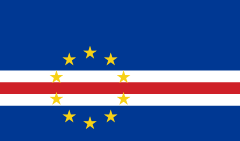
















_-_ribbon_bar.gif)

_-_ribbon_bar.png)

Honorary degrees
- 2010 – Honorary Doctorate, University of Beira Interior[92]
- 2014 – Honorary Doctorate, Meiji University[93]
- 2016 – Honorary Doctorate of Laws, Carleton University[94]
- 2016 – Honorary Doctorate, University of Coimbra[95]
- 2016 – Honorary Doctorate, European University of Madrid[96]
- 2017 – Honorary Doctorate, University of South Carolina[97]
Other awards
- 2005 – Personality of the Year by the Associação de Imprensa Estrangeira em Portugal (AIEP)
- 2007 – Freedom Award
- 2009 – Calouste Gulbenkian International Prize (shared with the Peace Research Institute in the Middle East)
- 2009 – Forbes List of The World's Most Powerful People in 2009[98]
- 2015 – W. Averell Harriman Democracy Award
- 2015 – The National German Sustainability Award
- 2019 – Charlemagne Prize
References
- "New UN chief Guterres pledges to make 2017 'a year for peace'". UN News Centre. United Nations. 1 January 2017. Archived from the original on 2 January 2017. Retrieved 2 January 2017.
- "E o prémio de melhor primeiro-ministro português vai para..." [And the award for the best Portuguese Prime Minister goes to...] (in Portuguese). Notícias ao Minuto. 28 November 2012. Archived from the original on 26 August 2018. Retrieved 26 August 2018.
- "António Guterres o melhor primeiro-ministro da democracia e Durão Barroso o pior" [Guterres was the best Prime Minister of the democracy and Durão Barroso was the worst] (in Portuguese). i. 10 April 2014. Archived from the original on 26 August 2018. Retrieved 26 August 2018.
- SAPO. "António Guterres: católico, socialista e político por acréscimo - Atualidade - SAPO 24". sapo.pt (in Portuguese). Archived from the original on 11 October 2016. Retrieved 15 October 2016.
- Falk, Pamela (5 October 2016). "Antonio Guterres, former Portugal Prime Minister, next United Nations secretary general". CBS News. Chicago, Illinois: CBS Corporation. Archived from the original on 18 October 2016. Retrieved 15 October 2016.
- "Biografia". parlamento.pt (in Portuguese). Archived from the original on 23 September 2016. Retrieved 15 October 2016.
- Master of dialogue Archived 21 October 2016 at the Wayback Machine European Voice, 5 January 2000.
- Hoge, Warren (25 May 2005). "Former Portuguese Premier Chosen to Lead U.N. Refugee Agency". The New York Times. New York City: New York Times Company. Archived from the original on 25 April 2018. Retrieved 14 February 2017.
- Costa Lobo, Marina; Magalhães, Pedro C. (2001). "The Portuguese Socialists and the Third Way" (PDF). European Consortium for Political Research. Archived (PDF) from the original on 8 November 2016. Retrieved 7 November 2016. Cite journal requires
|journal=(help) - "Who is Antonio Guterres? Meet the UN's next secretary-general". BBC. 6 October 2016. Archived from the original on 15 October 2016. Retrieved 15 October 2016.
- Riding, Alan (8 June 1992). "Who's No.1 in Lisbon? Portuguese Leaders Clash". The New York Times. New York City: New York Times Company. Archived from the original on 20 December 2016. Retrieved 14 February 2017.
- "PRESIDIUM ELECTED BY THE XIX CONGRESS". socialistinternational.org. Archived from the original on 1 August 2016. Retrieved 15 October 2016.
- "António Guterres | Biography". Encyclopedia Britannica. Archived from the original on 20 November 2018. Retrieved 20 November 2018.
- Watson, Rory (4 October 1995). "Socialists prepare to govern". European Voice. Archived from the original on 21 October 2016. Retrieved 15 October 2016.
- Wise, Peter (6 October 2016). "5 things to know: Portuguese who said no to EU but yes to UN". Financial Times. London, England: Nikkei, Inc. Archived from the original on 22 December 2017. Retrieved 18 October 2016.
- "Antonio Guterres, a Portuguese on the move". The Economist. London, England: Economist Group. 14 October 1999. Archived from the original on 18 October 2016. Retrieved 15 October 2016.
- Nuno Miguel Ropio (23 May 2010). "A longa marcha dos direitos homossexuais". Archived from the original on 27 October 2016. Retrieved 27 October 2016 – via Jornal de Notícias.
- Somini Sengupta (13 October 2016), António Guterres, Known for Nerve and Deal Making, Will Need Both at U.N. Archived 15 December 2016 at the Wayback Machine The New York Times
- "Lei n.º 30/2000, de 29 de Novembro" (PDF) (in Portuguese). 29 November 2000. Archived (PDF) from the original on 20 December 2016. Retrieved 19 October 2016.
- "Lei n.º 7/2001, de 11 de Maio" (PDF) (in Portuguese). 7 May 2001. Archived (PDF) from the original on 20 August 2018. Retrieved 18 October 2016.
- Chrisafis, Angelique; Borger, Julian (1 January 2017). "Will António Guterres be the UN's best ever secretary general?". the Guardian. Archived from the original on 20 November 2018. Retrieved 20 November 2018.
- "SI Presidium thanks António Guterres and sets in motion procedure to elect new President". socialistinternational.org. Archived from the original on 18 October 2016. Retrieved 15 October 2016.
- Warren Hoge (25 May 2005), Former Portuguese Premier Chosen to Lead U.N. Refugee Agency Archived 25 April 2018 at the Wayback Machine The New York Times.
- Refugees, United Nations High Commissioner for. "António Guterres (Portugal): 2005-2015". unhcr.org. Archived from the original on 18 October 2016. Retrieved 15 October 2016.
- Who is Antonio Guterres? Meet the UN's next secretary-general Archived 30 May 2018 at the Wayback Machine BBC News, 6 October 2016.
- Cha, Victor. The Impossible State. HarperCollins. p. 184.
- "High Commissioner for Refugees Visits China, Objects to North Korean Repatriation". The Congressional-Executive Commission on China. Archived from the original on 16 July 2018. Retrieved 18 April 2018.
- "Millions Leave Home in Iraqi Refugee Crisis". NPR. 17 February 2007. Archived from the original on 25 April 2018. Retrieved 5 April 2018.
- Alrababa'h, Ala'; Jarrar, Ghazi (18 August 2013). "Syrian Refugees: Time To Do The Right Thing". Sharnoff's Global Views. Archived from the original on 1 September 2013. Retrieved 2 September 2013.
- "Europe's response to Mediterranean Crisis is lagging far behind". Time Magazine. 23 April 2015. Archived from the original on 14 October 2016. Retrieved 13 October 2016.
- Miles, Tom (7 June 2013). "U.N. launches biggest aid effort for half of Syria's population". Reuters. Archived from the original on 20 August 2018. Retrieved 20 August 2018.
- Angelina Jolie appointed as Special Envoy of High Commissioner Guterres Archived 4 May 2018 at the Wayback Machine UNHCR, press release of 17 April 2012.
- Mohammed Tawfeeq (17 September 2012), U.N. envoy Angelina Jolie visits Syria refugees in Iraq Archived 18 October 2016 at the Wayback Machine CNN
- Mariano Castillo (21 June 2013), Angelina Jolie turns spotlight on Syria Archived 18 October 2016 at the Wayback Machine CNN
- Margaret Besheer (24 April 2015), Jolie Appeals for Syrian Refugee Action Archived 20 December 2016 at the Wayback Machine Voice of America
- Charbonneau, Louis; Miles, Tom (8 October 2015). "U.N.'s Ban rejects calls to keep refugee chief amid crisis". Reuters. Archived from the original on 28 June 2018. Retrieved 20 August 2018.
- Refugees, United Nations High Commissioner for. "Previous High Commissioners". unhcr.org. Archived from the original on 18 October 2016. Retrieved 15 October 2016.
- Tavares, Paulo (10 February 2016). "Guterres, Leonor Beleza, Lobo Xavier e Marques Mendes no Conselho de Estado". TSF (in Portuguese). Archived from the original on 3 December 2016. Retrieved 3 December 2016.
- "Guterres deixa Conselho de Estado, Marcelo designa António Damásio". Expresso (in Portuguese). 24 November 2016. Archived from the original on 3 December 2016. Retrieved 3 December 2016.
- "UN News - António Guterres appointed next UN Secretary-General by acclamation". United Nations Centre. United Nations News Service. 13 October 2016. Archived from the original on 13 October 2016. Retrieved 15 October 2016.
- António Guterres Candidacy for the position of Secretary-General of the United Nations Archived 25 November 2018 at the Wayback Machine. antonioguterres.gov.pt. Accessed 15 September 2016
- "António Guterres to be next UN secretary general". The Guardian. 5 October 2016. Archived from the original on 5 October 2016. Retrieved 5 October 2016.
- "Portugal's Antonio Guterres set to be UN secretary general". BBC. 5 October 2016. Archived from the original on 5 October 2016. Retrieved 5 October 2016.
- "António Guterres to be next UN secretary general". The Guardian. 5 October 2016. Archived from the original on 5 October 2016. Retrieved 5 October 2016.
- "Security Council nominates Portugal's Guterres as U.N. chief". Reuters. 6 October 2016. Archived from the original on 7 October 2016. Retrieved 6 October 2016.
- "Advocacy Cholera Accountability". Archived from the original on 7 July 2016. Retrieved 27 June 2016.
- "Advocacy Cholera Accountability". IJDH. Archived from the original on 7 July 2016. Retrieved 5 October 2016.
- "António Guterres (Portugal) - Informal dialogue for the position of the next UN Secretary-General". United Nations. Archived from the original on 14 December 2018. Retrieved 5 October 2016.
- "UN Live United Nations Web TV - Meetings & Events - Third Committee, 29th meeting - 71th General Assembly". Archived from the original on 30 October 2016. Retrieved 29 October 2016.
- "Will State Inaction at UN Imperil Haiti Cholera Response?". IPI Global Observatory. Archived from the original on 13 June 2017. Retrieved 8 June 2017.
- Laville, Sandra (18 January 2016). "UN whistleblower who exposed sexual abuse by peacekeepers is exonerated". The Guardian. London. Archived from the original on 17 June 2016. Retrieved 5 October 2016.
- Dinesh, Singh. "Guterres Puts Peace First". www.abclive.in. ABC Live. Archived from the original on 3 January 2017. Retrieved 2 January 2017.
- "Secretary-General Appoints Independent Panel to Assess, Enhance Effectiveness of UN-Habitat after Adoption of New Urban Agenda | Meetings Coverage and Press Releases". www.un.org. Archived from the original on 2 September 2018. Retrieved 1 September 2018.
- Hub, IISD's SDG Knowledge. "Review Panel Proposes Strengthening UN-Habitat, Establishing 'UN-Urban' | News | SDG Knowledge Hub | IISD". Archived from the original on 1 September 2018. Retrieved 1 September 2018.
- Muzenda, Archimedes (18 August 2017). "UN Urban: The Politics of language in Human Settlements Financing | African Urban Institute". African Urban Institute (Urban View Points). African Urban Institute. Archived from the original on 25 November 2018. Retrieved 1 September 2018.
- Ledrer, Edith. "UN chief: US will be replaced if it disengages from world". Yahoo! News. Archived from the original on 21 June 2017. Retrieved 20 June 2017.
- "World leaders call for release of Liu Xiaobo's widow Archived 14 July 2018 at the Wayback Machine". South China Morning Post. 14 July 2017.
- "The Latest: UN chief hopes sides will solve Catalan crisis". foxbusiness.com. 2 October 2017. Archived from the original on 3 October 2017. Retrieved 26 February 2019.
- "UN calls for resolving Catalonia crisis within the framework of the Spanish constitution". Tass.com. 27 October 2017. Archived from the original on 29 October 2017. Retrieved 28 October 2017.
- "'Very disappointed' UN chief Antonio Guterres urges Saudi Arabia to lift Yemen blockade". The First Post. 17 November 2017. Archived from the original on 22 June 2018. Retrieved 22 June 2018.
- "UN chief Antonio Guterres renews calls to stop 'stupid war' in Yemen, urges Donald Trump to pressurise Saudi Arabia". The First Post. 11 December 2017. Archived from the original on 22 June 2018. Retrieved 22 June 2018.
- "How The World Is Reacting To Trump Recognizing Jerusalem As Israel's Capital". NPR. 6 December 2017. Archived from the original on 4 August 2019. Retrieved 4 August 2019.
- "Eastern Ghouta Syria: The neighbourhoods below the bombs". BBC. 2 March 2018. Archived from the original on 2 March 2018. Retrieved 3 March 2018.
- "UN chief says Trump-Kim summit 'important milestone'". Moneycontrol.com. Archived from the original on 14 June 2018. Retrieved 13 June 2018.
- "Saudi-led coalition to probe Yemen air raid, Houthis report 40 children dead". Reuters. 10 August 2018. Archived from the original on 16 August 2018. Retrieved 16 August 2018.
- "Haley: US Rohingya Report 'Consistent' with UN Findings". VOA News. 28 August 2018. Archived from the original on 9 February 2019. Retrieved 7 February 2019.
- "TruNews with Rick Wiles, Real News, Latest News, Christian News". TruNews. Archived from the original on 26 September 2018. Retrieved 26 September 2018.
- "UN chief warns of perils of new technologies - Xinhua | English.news.cn". www.xinhuanet.com. Archived from the original on 26 September 2018. Retrieved 26 September 2018.
- Network, António Guterres,Voltaire. "Opening of the 73rd session of the United Nations General Assembly, by António Guterres". Voltaire Network. Archived from the original on 25 September 2018. Retrieved 26 September 2018.
- "Human rights groups call for investigation into China's Uighur 're-education camps'". SBS News. 5 February 2019. Archived from the original on 7 February 2019. Retrieved 7 February 2019.
- "UN condemns Israeli PM's West Bank annexation plans". CBC News. 11 September 2019. Archived from the original on 11 September 2019. Retrieved 18 September 2019.
- "UN chief 'concerned' over Turkish offensive in Syria". Deccan Herald. 11 October 2019. Archived from the original on 11 October 2019. Retrieved 16 October 2019.
- "De-escalation of Turkish military operation in northern Syria 'absolutely essential'". UN News. 10 October 2019. Archived from the original on 15 October 2019. Retrieved 16 October 2019.
- Honorary Advisory Council Archived 21 October 2017 at the Wayback Machine Dag Hammarskjöld Fund for Journalists.
- Vision Award Jury Archived 19 October 2016 at the Wayback Machine Champalimaud Foundation.
- Leadership Council Archived 11 November 2018 at the Wayback Machine Clean Cooking Alliance.
- António Guterres Archived 7 October 2016 at the Wayback Machine Club of Madrid.
- Members Archived 14 October 2018 at the Wayback Machine International Gender Champions (IGC).
- Board of Trustees Archived 18 October 2016 at the Wayback Machine Calouste Gulbenkian Foundation.
- A New Business Model for Humanitarian Assistance? A challenge paper Archived 17 April 2018 at the Wayback Machine World Economic Forum (WEF).
- "Portuguese honor Guterres - News - southcoasttoday.com - New Bedford, MA". Archived from the original on 14 January 2018. Retrieved 10 May 2017.
- Hume, Tim. "Portugal's Antonio Guterres poised to become next UN secretary-general". cnn.com. Archived from the original on 14 March 2018. Retrieved 13 March 2018.
- Leopold, Evelyn (5 October 2016). "World's Top Diplomat -- It's Guterres Of Portugal!". HuffPost. Archived from the original on 20 September 2017. Retrieved 15 October 2016.
- "Catarina Vaz Pinto - UNESCO - World Forum On Culture and Cultural Industries - Florence 2 - 4 October 2014". focus2014.org. Archived from the original on 14 October 2016. Retrieved 15 October 2016.
- teixeira, patricia. "Catarina Vaz Pinto". artemrede.pt. Archived from the original on 14 October 2016. Retrieved 15 October 2016.
- "Portugal's Guterres poised to be next UN secretary-general". sbs.com.au. Archived from the original on 12 October 2016. Retrieved 15 October 2016.
- "Cidadãos Nacionais Agraciados com Ordens Portuguesas". Página Oficial das Ordens Honoríficas Portuguesas (in Portuguese). Archived from the original on 29 December 2018. Retrieved 13 July 2016.
- "Cidadãos Nacionais Agraciados com Ordens Estrangeiras". Página Oficial das Ordens Honoríficas Portuguesas (in Portuguese). Archived from the original on 27 March 2019. Retrieved 13 July 2016.
- web, Segretariato generale della Presidenza della Repubblica-Servizio sistemi informatici- reparto. "Le onorificenze della Repubblica Italiana" (in Italian). Archived from the original on 18 August 2016. Retrieved 5 October 2016.
- "Boletin Oficial del Estado" (PDF). Archived (PDF) from the original on 4 March 2016. Retrieved 29 October 2015.
- "III. Otras disposiciones" (PDF). Boletín Oficial del Estado (in Spanish) (143). 15 June 2002. Archived (PDF) from the original on 14 January 2020. Retrieved 20 August 2018.
- , Mundo Portuguese, press release of 4 May 2010.
- Ceremony for conferral of an honorary doctorate, and lecture Mr. Antonio Guterres, United Nations High Commissioner for Refugees Archived 26 September 2015 at the Wayback Machine Meiji University, press release of 13 November 2014.
- Carleton to Award Honorary Doctorate to Diplomat and Global Leader Antonio Guterres Archived 22 October 2016 at the Wayback Machine Carleton University, press release of 27 January 2016.
- Marujo, Miguel (3 May 2016). "Guterres será doutor 'honoris causa' por Coimbra". Diário de Notícias (in Portuguese). Archived from the original on 27 June 2018. Retrieved 20 August 2018.
- "Honoris Causa". European University of Madrid. Archived from the original on 21 August 2018. Retrieved 20 August 2018.
- Jeff Stensland (24 April 2017), U.N. secretary-general to address UofSC graduates University of South Carolina, press release of 24 April 2017.
- "Forbes List of The World's Most Powerful People in 2009". Forbes, USA. 30 December 2009. Archived from the original on 31 December 2016. Retrieved 14 December 2016.
External links
| Wikiquote has quotations related to: António Guterres |
| Wikimedia Commons has media related to António Guterres. |
- Official website of Antonio Guterres - UN Secretary-General
- Official website of António Guterres in Gov.pt (in Portuguese)
- Appearances on C-SPAN
| Party political offices | ||
|---|---|---|
| Preceded by Jorge Sampaio |
Secretary-General of the Socialist Party 1992–2002 |
Succeeded by Eduardo Ferro Rodrigues |
| Political offices | ||
| Preceded by Jorge Sampaio |
Leader of the Opposition 1992–1995 |
Succeeded by Fernando Nogueira |
| Preceded by Aníbal Cavaco Silva |
Prime Minister of Portugal 1995–2002 |
Succeeded by José Manuel Barroso |
| Positions in transnational organisations | ||
| Preceded by Pierre Mauroy |
President of the Socialist International 1999–2005 |
Succeeded by George Papandreou |
| Positions in intergovernmental organisations | ||
| Preceded by Ruud Lubbers |
United Nations High Commissioner for Refugees 2005–2015 |
Succeeded by Filippo Grandi |
| Preceded by Ban Ki-moon ( |
Secretary-General of the United Nations 2017–present |
Incumbent |
